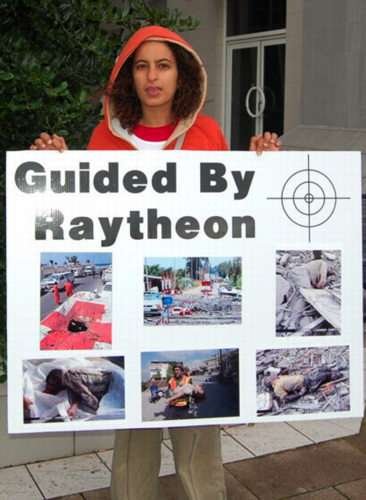By a complete stroke of luck, Raytheon stocks skyrocket after overseas intervention, claims CNBC analyst.
'Maybe we'll help the Saudis send some troops of their own to offset the influence of Iran and Russia', speculated Jim Cramer on his CNBC show Mad Money. 'That's good news for these arms dealers, plus defense is the one place that Congress is going to spend lots and lots of money.'

It seemed as though Cramer had accidentally stumbled upon a foul cornerstone of the US economy whilst presenting another episode of his light-hearted investing tips program that has been running since 2005: that certain corporations make an absolute killing on US foreign interventions and the stock market reflects this.
He noted the missile manufacturer Raytheon as the most bullish in the group of US defense giants. 'Raytheon could have a lot more room to run because it just broke out above a rising triangle pattern', he claimed.
In fact, the Cambridge, Massachusetts-based company saw its market capitalisation rise by roughly $2.5 billion in response to President Donald Trump's decision to strike Syria. This caps a few years of impressively solid growth for Raytheon, whose stock price has risen roughly 30% since the start of Saudi Arabia's carpet-bombing of Yemen using their American-made smart missiles.
Ultimately, Cramer's assertion that 'political worries can boost top defense stocks' is a highly-evidenced paradigm that consistently demonstrates its own validity whenever a US-led intervention occurs. However, to chalk it off as some kind of coincidence rather than a creature of political design is incredibly naive.

To look at the movement of executives between the Pentagon and military-industrial giants like Raytheon enabled by lax to non-existent conflict of interest regulations paints an incredibly clear picture - the US is governed by 'experts' who have made a career out of military profiteering.
Take William H. Swanson for example, the CEO of Raytheon from 2004 to 2014. He holds a keycard to the Pentagon as a member of the Secretary of the Air Force Advisory Board, who were naturally intimately involved in the recent Syria strikes. No regulations prohibit Swanson from also serving on various military advocacy groups such as the Association of the United States Army, the Navy League, the American Institute of Aeronautics and Astronautics, the National Defense Industrial Association and the Aerospace Industries Association.
In 2014 Swanson held 0.23% of Raytheon's stock - well over the 0.10% industry average for CEOs - that at the time was worth about $41.9 mil. There are no regulations in place that would force Swanson to part with his stake in the company or recuse himself in order to sit on the Air Force Advisory Board, and there is no indication that he did this.
Former Obama-era deputy secretary of defense Robert Work was elected to Raytheon’s board of directors about a month after leaving the Pentagon in 2017. Although as a senior official he is prohibited from directly lobbying his Pentagon former-coworkers for two years after leaving, he brings a wealth of exclusive knowledge of the inner workings of military decision-making to his new employers, and his contacts become their contacts.
The revolving door between the Pentagon has been functioning especially smoothly since the 1980s when Ronald Reagan ramped up defense spending, outsourced Pentagon services to private contractors and gutted regulatory oversight, enabling commercial interests to accumulate huge policymaking influence. Under a Trump Administration the revolving door has been jet-powered, with a whopping 80% of top Defence Department officials coming from the boardrooms of private contractors - almost double the proportion under Obama.
This kind of synergy between government, military and industry is becoming more pronounced year-on-year. For retired Lockheed Martin directors every country that Mohammad bin Salman bulldozes with US hardware represents a sweeter portfolio return for their brattish grandchildren to blow on Audis and Miami seafront apartments.
I'd take Jim Cramer's advice and put your money on defense stocks next time you feel things rumbling in the Middle-East. But to achieve meaningful change draft the General Dynamics boardroom to fight on the frontlines every time a new conflict is fabricated and watch the hawks turn to pure white doves.